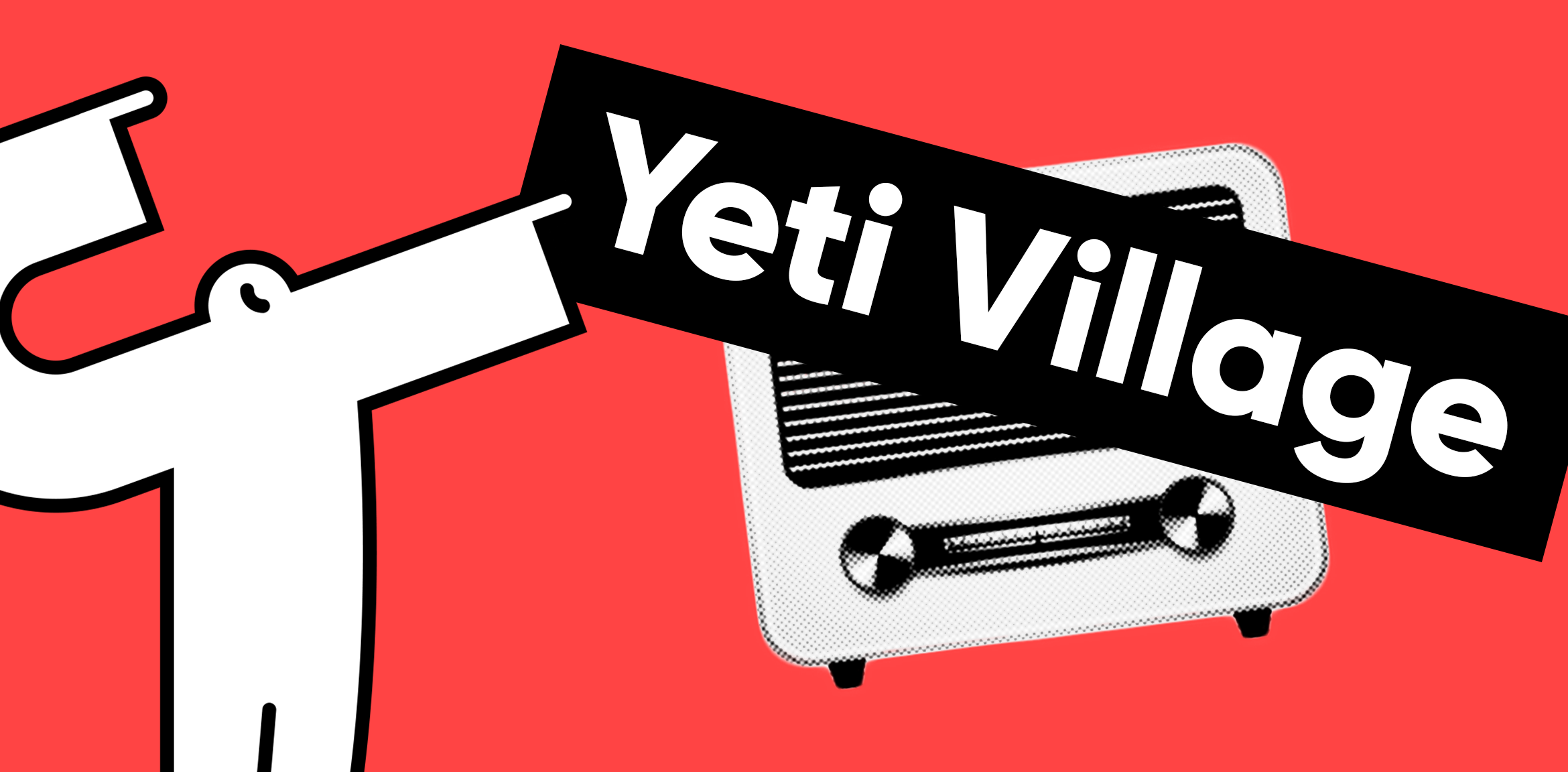
Ben Mullins, Senior Developer at Last Call Media, joins us for the third episode of Yeti Village to talk about his latest project, Credit Due, and life outside of work as a father and musician.
You can listen to this episode of Yeti Village below, or by searching for “Yeti Village” in Apple Podcasts or the podcast directory of your choice.
Transcript
Susie: Hi I’m Susie Howard and this is “Yeti Village,” a show where we interview people in and around the tech community. On this episode we have Ben Mullins, a senior developer at Last Call Media. We’ll be talking about his latest project, a Drupal admin theme called “Credit Due,” and his work outside of Last Call as both a father and a musician.
Susie: Well thank you for joining me for the third installment of “Yeti Village.” Why don’t you introduce yourself?
Ben: Okay I’m Ben Mullins, I am a senior developer at Last Call Media. I work out of Ann Arbor, Michigan, and work with Drupal.
Susie: Awesome. What is your day to day aspect … what is your role here at Last Call?
Ben: It depends on … I’ll either be working on client projects, which is generally just building a site from the ground up, or support requests when I’m between projects. So fixing things with existing sites, and other times I’ll work on independent special projects. One of which I released recently which is an admin theme for Drupal called “Credit Due” that replicates the WordPress admin UI for Drupal users.
Susie: Awesome, yeah, I saw you post the blog post yesterday and I saw that you said it was getting some pretty good responses on Reddit. Can you give a little background as to why you felt that was necessary and what the goal of that project was?
Ben: So, it started and it’s summarized a little bit in the blog post, but a couple years ago we rebuilt a site for a former employer of mine and we built it in WordPress and noticed that the end users had a lot fewer support requests than they would otherwise so points of confusion that were frequent on Drupal were not happening at all in WordPress, and we didn’t even have to provide them documentation. The WordPress UI allowed them to engage in typical web behavior, hunting and pecking and looking for the right thing and just figuring it out. They were able to do that independently as opposed to Drupal sites where we’d provide them with documentation and they would still fail to be able to find the things they needed and, so that was interesting and I had to wonder if there was something about WordPress’ UI that was better than Drupal’s for non technical users.
Ben: The success of the project made me almost lean towards using WordPress for things even though I preferred developing in Drupal, and then we had a couple other sites that we built in WordPress because everybody liked working with it so much and it was clear that they were far too complex for WordPress and became very difficult to manage. It’s been in the back of my mind for years. I had an interest in providing the user experience of WordPress but with the functionality of Drupal, allowing people to have an easy-to-use website that’s also … Leverages a lot of the power and features of Drupal.
Susie: Awesome. That seems like a really intense undertaking and it’s pretty great that it was just launched. Are you anticipating a lot of people using that theme?
Ben: I’m not 100% sure one way or the other. I can think of several scenarios that I’ve personally run into where had that theme been available it would have been used, so hopefully if word gets around that it exists and I have successfully made it a stable, usable theme for situations beyond the ones that I tested it in. I think there are going to be situations where people will wind up using it ‘cause it is not an unfamiliar scenario right now for clients to want WordPress ‘cause they enjoy working with it even though their site really would benefit from a more complex CMS like Drupal.
Ben: So, hopefully people are willing to give it a shot, but even if it’s not used I also wanted it to just exist in order to help amplify the conversation that Drupal’s a great system but it’s really written without empathy for non developers. There’s a lot of scenarios where something is possible but it is hard to get to if you’re not technically minded, and the response is often dismissive as saying “Look we provided you documentation, isn’t that good enough?”
Ben: But the fact is that if there’s a system that’s intuitive, that allows people to figure things out on their own it’s going to be viewed more favorably than something that requires supplementary instructions.
Susie: That’s great. It will be great to see what the outcome is.
Ben: Yeah. Even already, and it’s only been out for 12 hours or so, just seeing other people who enjoy working in Drupal also acknowledging that it’s not very friendly to non developers has been a very nice thing to see and I think it’s a voice that is often … It’s not heard as loudly as I think it probably should be ‘cause it’s pretty easy … When something’s written by developers it’s pretty easy to squash anybody complaining that something is too difficult or too complex. People can just be dismissed as ignorant or lazy and no, we’re just all busy people and it’s a lot more enjoyable to use something that’s easy.
Susie: Absolutely. You mentioned that you are currently based in Ann Arbor, Michigan. How did you get started with Last Call?
Ben: I had a baby on the way and I was looking for remote jobs, that was basically it.
Susie: Awesome.
Ben: I knew from other parents that having a flexible schedule and not being stuck in an office would be really helpful, and it has been. And then as a bonus it turns out that I think as far as cultural fit, Last Call might be the best fit as far as my coworkers. It seems like we have a lot of similar interests. When I hear people talk they kind of sound like me, and it’s nerds that are aware there are non-nerds in the world and it’s a nice group of people.
Ben: As much as I like working remotely this is probably the group of people that I would most enjoy working face to face with.
Susie: That’s awesome. How long have you been with the company?
Ben: A little over a year, right now. I think I started at the beginning of June and then the baby came out at the end of June.
Susie: That’s great. How has fatherhood been treating you?
Ben: It’s actually helped me be better at UX things, and that’s among the reasons that I got motivated to finally make good on my WordPress clone for Drupal was the amount of fatigue mentally that having a child introduces to my life has made it easier to empathize with people who don’t necessarily have huge technical backgrounds. It’s very easy to access the side of me that’s tired and is not able to ingest a huge amount of information and just being able to have access to that makes it easier for me to design with non technical people in mind. I actually feel like I’m in a unique position where I have enough technical background that I’m not completely ignorant but I’m able to essentially have a conversation with a really fatigued parent and get user data from them and it’s me.
Ben: Other than the fatigue, he’s really cute and all that normal parent stuff that people talk about applies to me as well. There’s all sorts of affection and new emotions that I didn’t think a grumpy programmer could feel but yeah he’s a wonderful little guy.
Susie: That’s awesome. That sounds wonderful. Your background, the field you’re in now, is this something, in the position you’re in now, is this something that you went to school for or is this something you came across later in life?
Ben: I did go to school for it but I didn’t go to school with software development in mind. Prior to that I was a musician. I did music for commercials, video games, and whatever else people would pay me for. It was inconsistent and I wanted something a little more predictable even though the music stuff was really cool to talk about at high school reunions but I wound up taking a bunch of different community college classes to see if something clicked for me and I took some software classes and it was very interesting, as I was programming, within a couple weeks I felt the same mental muscles working that I did when I composed music and by the end of my first semester my programming teachers thought I was an experienced programmer just coming back to tighten up my craft but I had never done it before. So that seemed like a good sign.
Ben: I went to grad school for UX at University of Michigan shortly after that. I really liked the UX background that I got but I realized that I wanted to spend more time building stuff than in meetings so I just pursued development jobs since then.
Susie: That’s pretty amazing with a musical background how well that clicked for you.
Ben: When I thought about it there’s a lot of similarities and I’ve heard that a lot of engineers are musically skilled and vice versa. Essentially music is a fix set of parameters that you can work in. There’s pitch, tempo, couple other things, but there’s an infinite number of ways you can combine these existing things into something that works, and if you work as a musician long enough you begin seeing patterns and it’s really the same, at least for me, it’s a lot of the same analytical and conceptual skills that apply to programming. It might seem hippy-ish but I swear I can actually just feel the same mental muscles at work when I did it.
Susie: Wow. That’s pretty awesome. Is that something you still do on the side just for fun?
Ben: Yeah. Everyone once in awhile I still … I guess it was maybe a year and half ago or two years at this point but … No just last year Google used one of my songs for something, and then I think two years ago I had a commercial for Home Goods that I did. I’m not actively pursuing it but I still have agents and they sign me up for stuff and they know that I only do guaranteed things now. It used to be you could compete for things and I don’t have the time to do that. But I do get, maybe it averages out to about once a year, and then I also do work … Someday I’ll put something out on Spotify that I just work on for fun and I notice that my music’s a lot better now that it’s not my primary source of income. When it was my full-time job I kinda … I would say, I mean everyone’s experience is going to be a little different but I recall taking a C++ class, wondering what I’d gotten myself into and then remembered that community college tuition is really inexpensive so it’s okay.
Ben: It only took about two weeks and then suddenly this really intimidating thing just made sense. It was strange how instant that shift was and I do think that the music experience predisposed me to that. There’s a lot of similar things particularly with composition. It worked out for me I was able to turn myself around from a scuzzy musician to a employable dude with a master’s degree in like two and half years.
(music)
Susie: You can learn more about “Credit Due,” the Drupal 8 Admin theme created by Ben that replicated the WordPress admin UI by visiting lastcallmedia.com/blog.
Susie: “Yeti Village” is produced by me, Susie Howard. Today’s music is an original song by Ben, titled “Water Bird.” You can subscribe to “Yeti Village” on the Apple podcast app or your podcast service of choice.
Susie: You can also drop us a line at lastcallmedia.com.
(music)



